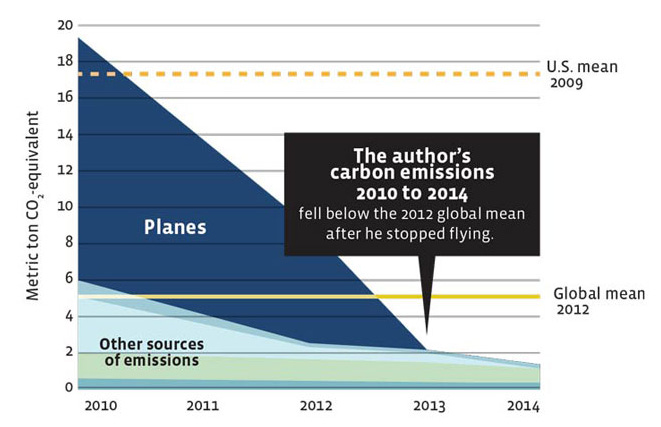Stop Flying! Stay grounded international network launched to counter aviation
There is no better way of frying the planet than flying. The aviation sector is one of the fastest growing sources of greenhouse gases. The industry plans make matters worse, by doubling the number of air passengers over the next 20 years.
So, to reduce greenhouse gas emissions, for the 10% of the world’s population who fly, one of the most important things we can do is to stop flying. Or at least massively reduce the amount of flying we do.
Peter Kalmus is a climate scientist who doesn’t fly. In 2010, flying accounted for two-thirds of his annual emissions. As he reduced and then stopped flying, his emissions fell dramatically:
This sort of individual action is important, as are initiatives like “No fly climate sci“. (In case you’re wondering, I don’t own a car, I’m vegan, and I don’t fly.)
On the other hand, UN Environment chief, Eric Solheim’s profligate flying, is exactly what we should be avoiding. He travels 80% of his time and holds gold frequent flyer cards at all three major airline alliances.
But we also need systemic, structural change to address climate change. More airports mean more people flying. But any politician putting forward plans to end cheap air travel will be extremely unlikely to win an election.
Earlier this month, Stay Grounded, a new network of organisations, was formed to address some of these problems.
Stay Grounded’s position paper explains who the people involved in the network are:
We are people, communities and organisations from around the world, dealing with the multiple impacts of aviation: Some of us are directly affected by airport infrastructure and the negative health impacts of pollution and noise from aircraft. Some of us are climate justice activists and young people who want to live our lives on a healthy planet. Some of us live in communities defending our homes, farmland and ecosystems from land grabbing for new airports, airport expansion, biofuel production or projects for offsetting aviation emissions. Some of us are academics, trade unionists and workers in the transport sector, as well as environmental and transport organisations from around the world, and from initiatives fostering alternative modes of transport such as railways.
The position paper puts forward 13 steps to “transform transport, society and the economy to be just and environmentally sound”. 130 organisations have signed on to position paper.
Recently Stay Grounded organised two weeks of action. Here’s the network’s press release about the actions:
Stay Grounded Action Weeks: 27 actions, 11 countries, 3 continents
27 actions conducted around the world to protest aviation expansion
“Trains, not planes”: Stay Grounded Network meeting concludes action weeks
130 organisations have signed a position paper with 13 steps for a just transport system
October 15th, 2018 – Protests around the world are rising against growth of air traffic and airport expansion, and its effects on the climate and local populations. The past two weeks, the new global network Stay Grounded conducted Global Action Weeks, with 27 actions taking place in 11 countries. The action weeks ended yesterday with an action and an international Stay Grounded conference in Vienna (12-14th of October), which was held along with the Back on Track network. Back on Track promotes night trains as an alternative to middle haul flights in Europe.
More than 120 organisations around the world have issued a Stay Grounded position paper outlining 13 steps for a transition towards a transport system that is socially just and ecologically sustainable.
In Europe this summer, soaring temperatures and escalating labour conflicts demonstrated that aviation has hit an environmental and social ceiling. Thousands of workers went on strike to demand better working conditions in the sector, while several tourist destinations suffered from overcrowding.
Mira Kapfinger, coordinator of Stay Grounded, said „These limitations mark actual boundaries. Aviation cannot continue its growth path, because it is impossible to maintain low prices and pay decent wages at the same time, and to expand tourist destinations without irreversible damage to their social and ecological structures“.
She added, “The new IPCC report leaves no doubt: the climate crisis demands an urgent reduction of air travel. It is also no option to increase the number of flights or expand airports without threatening the health and well-being of the communities and biodiversity around these airports.”
Around the world, 1200 airport infrastructure projects are planned or being built. In Istanbul, for example, a new mega airport with six runways is about to be finished, built in a protected ecosystem which once were the green lungs of Istanbul. Workers went on a strike in September because of bad working conditions and hundreds of deadly accidents at the construction site, and were heavily repressed.
In Mexico during the Global Action Weeks, indigenous communities protested against the Mexico City International Airport (NAICM), also a mega project with six runways, which would be built in a very sensitive ecosystem. Gabriela Vega Tellez from the “Peoples’ and Organisations’ Coordination of the Eastern Mexico State in Defense of the Land, the Water and its Culture” explained: “Right now, in indigenous territory, hills are being blown for extracting materials to fill the floor of Texcoco Lake in an attempt to prevent the new airport from sinking and flooding. Land is also taken from indigenous peoples and peasants for the construction of wind farms and a giant solar energy power plant to supply the new airport. They pretend it’s a green airport, and we know that this is a lie.”
Despite all the negative effects from aviation, industry and politicians refuse to face the true extent of the crisis, planning massive growth of air travel – while pretending the growth can be green. In Vienna, at the start of the Global Action Weeks, activists from Stay Grounded intervened in the opening of the European Aviation Summit in Vienna, interrupting EU Transport commissioner Violeta Bulc’s speech about the supposedly green future of aviation.
The counter-speech shed light on the problematic aviation greenwashing strategies of politicians and the industry, who pretend to achieve carbon-neutral growth of aviation through cheap and ineffective offsets, biofuels and speculative technologies that may never be realized. Instead, the activists made clear that the unfair privileges of the aviation industry need to be cut, and that kerosene, tickets and frequent flyers need to be taxed.
Stay Grounded actions and events took place in Austria, Mexico, Germany, UK, France, Switzerland, Philippines, Australia, Belgium, the Netherlands and Denmark.







